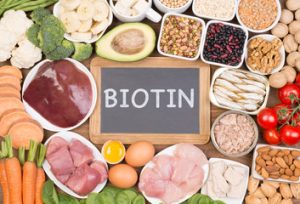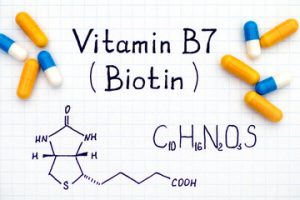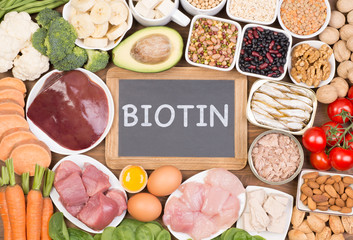We all wish to be happy, and the secret of happiness lies in good health. Our food choices decide on our health & well-being. The food we eat is the fuel for our body cells to live and function optimally. In recent years, people talk a lot about vitamin deficiencies. Insufficiency in the amount of vitamin (vitamin deficiency) as compared to the body’s requirement is defined as a deficiency. Deficiencies in vitamins A, B-complex, C, D, E and K are widespread. B vitamin deficiency is the most common, and this includes a number of B vitamins like thiamine (B1), riboflavin (B2), niacin (B3), pantothenic acid (B5), pyridoxine (B6), biotin (B7), folate (B9) and cobalamin (B12). Let’s read more about biotin deficiency.
Biotin and its Importance for our Health

Biotin, which is also known as vitamin H, B7, or coenzyme R, is a water-soluble B vitamin with myriad health benefits. Biotin cannot be synthesized in our body and is mostly acquired from the food we eat. The beneficial microbes living in our gut known as the gut flora also contribute to our biotin levels, though in small amounts. Water-soluble vitamins cannot be stored in the body, and hence their requirement has to be met on an everyday basis. Biotin is a much-needed vitamin for our good health, and its functions include-
Role in Energy Production
The food we eat is the fuel for energy production inside our body. Conversion of food into energy happens in the presence of oxygen through a process called biochemical respiration. Biotin aids in energy production by being a component of enzymes favoring this process.
Optimal maintenance of Blood sugar and cholesterol levels
The carbohydrates and fats inside our body are broken down into simpler units (glucose and fatty acids) and are utilized either for energy production or stacked up for future use, based on the need. Biotin has a role in these processes too. Biotin-containing enzymes called carboxylases help in the production of glucose and fatty acids, thus regulating blood sugar and cholesterol levels.
Keeps you away from Diabetes
Biotin helps in stimulating the production of insulin from our pancreas. Insulin is a hormone that influences the way our body uses digested food for energy. Glucose, a simple carbohydrate is a major fuel source for our body. Our digestive tract breaks down carbohydrates from food sources into glucose. Glucose enters the bloodstream, and there is always a balance maintained between our cell’s requirement for glucose and the glucose supply through the blood. This balance is important for deciding glucose levels in the blood. Insulin takes up the responsibility of maintaining this balance, or in other words, it renders blood sugar control.

Renews and Repairs body cells
Proteins are like building blocks of our bodies. Their simpler units are called amino acids. There are many amino acids, and their varied combinations result in the synthesis of different types of body cells. Biotin-containing enzymes metabolize amino acids, that is, they take part in the synthesis of new cells and repair cells that are worn out.
Gives a healthy look to your Skin, Hair, and Nails
Biotin plays a vital role in the production of keratin, a protein. Owing to its protective nature, keratin is the fundamental component of hair and nails. Compared to the other types of proteins in our body, keratin is less prone to exhaustion like breakage from scratching or tearing. Biotin has an essential role in skin health by promoting regeneration and healing. Skin cells in our body have a rapid turnover. Old skin cells should be replaced quickly with new ones in order to avert aging signs like wrinkles, dark spots, and so on.
Your Nerves to demand biotin, why?
Metabolism refers to the processes that a body cell undertakes to live and perform its functions. Biotin supports nerve cell metabolism by reviving and repairing damaged nerve cells. It also prevents nerve cells from damage by helping the body produce more myelin. Myelin is the protective covering for nerve cells. The communication between nerve cells is important for a healthy nervous system. Healthy levels of myelin maintained by biotin favor efficient communication between cells, thus preventing neurological disorders like multiple sclerosis.
An Insight about Biotin deficiency
Biotin deficiency is seen following the use of certain medications, including antibiotics and anti-seizure drugs. Other causes of deficiency include aggressive dieting, intestinal problems like Crohn’s disease and colitis, long term intravenous feeding and genetic disorders where the body is unable to use biotin (as in biotinidase enzyme deficiency). Having known the necessity of biotin to improve health, it is necessary to consume them through proper diet or use a patch to increase your Biotin level also. When there is a deficit of a particular nutrient, supplements can help us in coping with it. Biotin is available in supplement form. It’s available as one of the components in multivitamin or B complex supplements, and individual biotin supplements are also accessible in the market. The dose of biotin in supplements varies from 10, 50 and 100 mcg, and its usage should be based on individual needs and most importantly, physician’s advice.
A shortfall in biotin levels may impact our health in the following ways:
- Energy production gets hampered, resulting in fatigue.
- Skin health gets affected evidenced by red rashes, dry or scaly skin.
- Hair and nails become brittle and are prone to damage easily.
- Muscle pain and weakness may develop.
- Lack of promptness in repairing nerve cell damage can cause a burning or prickling sensation in the hands and feet. At a more severe stage, lethargy, depression, and hallucinations can also result.
What is the daily requirement of biotin?
The daily requirement of biotin for an adult is 30 micrograms (mcg). For a lactating mother, this amount increases to 35 mcg. For children, it varies from 5 mcg in infancy to 12 mcg in childhood.
Food sources of biotin include organ meat, egg, fish, dairy products (like milk, cheese, and yogurt), nuts, seeds (mainly sunflower seeds), whole grains (including barley and corn), certain vegetables (like sweet potato, green peas, carrots, and cauliflower) and mushroom. Avidin, a component present in raw eggs prevents biotin absorption in our digestive tract. Cooking denatures avidin, hence cooked eggs are considered good sources of biotin. Biotin is also damaged by food processing; hence choose unprocessed foods to benefit from biotin.
Anyone can suffer from biotin deficiency, and it is important to check for different signs and symptoms to understand it better. Biotin deficiency is very much treatable through a proper diet and required supplements.








